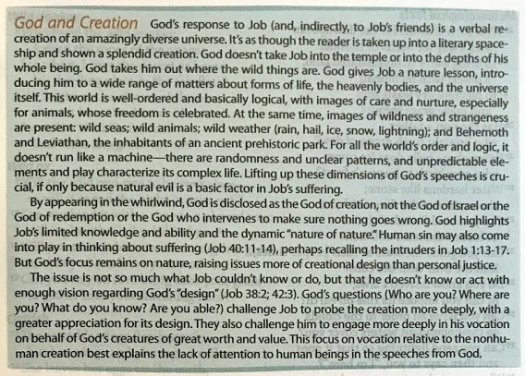Job 37: The theme from the end of the last chapter continues here. Elihu continues to describe God’s power and control over natural events. Most of the events are focused on weather related disasters. His point here is that he wants to emphasize that God is a powerful being who controls everything. Elihu ends his speech telling Job that God is pretty much too busy to listen to him specifically.
Job 38: Enter God. He bombards Job with a bunch of questions. The first set focuses on the beginning of creation or the establishment of order. The second set focuses on more of the first part of creation. In his questioning God challenges Job wondering if he has done anything. The third set focuses on “meteorological facts.” There’s a lot of questions about weather and space. In the next set we see a shift to animals.
I had to include this sidebar:

Job 39: A focus on animals continues in this chapter. God continues to directly question Job asking if he has done anything like God had done. God focuses on several different types of animals in this chapter with the goal of emphasizing that Job couldn’t do what god has done.
Introduction to Matthew: I’m excited to be back in a Gospel. I’ve enjoyed reading Paul’s letters, but it’s nice to see another Gospel.
I like how the intro starts in the CEB study bible: “The overarching theme of the Gospel of Matthew is the role of Jesus as the Christ in relation to God’s plan of salvation for all humanity” (p. 3 NT). One other tidbit from this chapter is that it was written in the last decades of the 1st century CE and was published anonymously.
Matthew 1: The first half of this chapter traces the genealogy of Jesus from Abraham. One fun thing of note: “So there were fourteen generations from Abraham to David, fourteen generations from David to the exile in Babylon, and fourteen generations from the exile in Babylon to the Christ” (1:17).
The next half focuses on the birth of Jesus. We are told how Mary became pregnant by the Holy Spirit while she was engaged with Joseph. Joseph was a good man and he didn’t want to humiliate Mary, so he broke off the engagement quietly. An angel visited Joseph during a dream and told him that Mary was carrying the son of God, thus fulfilling the prophecy in Isa 7:14. Joseph woke up, married Mary, and waited until she had Jesus before they had sexual relations. No joke, the Bible says this.
One last thing that helped from the notes to the last verse (25) in the chapter (p. 6 NT):
Naming a child in the ancient Mediterranean world was a significant act on the part of the father. In naming the child, the father officially acknowledge the infant as his own legitimate child. Here, the act of naming functions as a virtual adoption of Jesus by Joseph as his son, even though he had nothing to do with the pregnancy of Mary. This is how Jesus became an heir to the Davidic dynasty. Now he is rightly called the “son of David.”
Service Unavailable
The server is temporarily unable to service your request due to maintenance downtime or capacity problems. Please try again later.
Additionally, a 503 Service Unavailable error was encountered while trying to use an ErrorDocument to handle the request.
